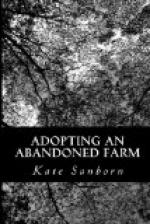It is now nearly a year since that little adventure, but it is still a subject of mirth, even in other towns. A friend calling yesterday told me the version he had just heard at Gillford, ten miles away!
“You bet they have comical goings-on at that woman’s farm by the Gooseville depot! She got a regular menagerie, fust off—everything she see or could hear of. Got sick o’ the circus bizness, and went into potatoes deep. They say she was actually up and outdoors by day-break, working and worrying over the tater bugs!
“She’s a red-headed, fleshy woman, and some of our folks going by in the cars would tell of seeing her tramping up and down the long furrows, with half a dozen boys hired to help her. Soon as she’d killed most of her own, a million more just traveled over from the field opposite where they had had their own way and cleaned out most everything. Then, what the bugs spared, the long rains rotted. So I hear she’s giv’ up potatoes.
“Then she got sot on scooping out a seven by nine mud hole to make a pond, and had a boat built to match.
“Well, by darn, she took a stout woman in with her, and, as I heerd it, that boat just giv’ one groan, and sunk right down!”
As to the potatoes, I might never have escaped from that terrific thralldom, if a city friend, after hearing my woful experience, had not inquired quietly:
“Why have potatoes? It’s much cheaper to buy all you need!”
I had been laboring under a strange spell—supposed I must plant potatoes; the relief is unspeakable.
Jennie June once said, “The great art of life is to eliminate.” I admired the condensed wisdom of this, but, like experience, it only serves to illume the path over which I have passed.
One little incident occurred this spring which is too funny to withhold. Among the groceries ordered from Boston was a piece of extra fine cheese. A connoisseur in cheese had advised me to try it. It recommended itself so strongly that I placed it carefully under glass, in a place all by itself. It was strong—strong enough to sew buttons on, strong as Sampson, strong enough to walk away alone. One warm morning it seemed to have gained during the night. Its penetrating, permeating power was something, almost supernatural. I carried it from one place to another, each time more remote. It would not be lonely if segregrated, doubtless it had ample social facilities within itself! At last I became desperate. “Ellen,” I exclaimed, “just bring in that cheese and burn it. It comes high, too high. I can not endure it.” She opened the top of the range and, as the cremation was going on, I continued my comments. “Why, in all my life, I never knew anything like it; wherever I put it—in pantry, swing cupboard, on the cellar stairs, in a tin box, on top of the refrigerator—way out on that—” Just then Tom opened the door and said:
“Miss, your fertilizer’s come!”




